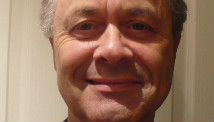John Gaffney says Francois Hollande, seen here at the Elysee Palace on January 11, 2013, needs to rethink his presidency.
STORY HIGHLIGHTS
- French President Francois Hollande and the country's Socialists are in a strong position
- Despite this, Hollande has made little progress since his election, says John Gaffney
- Gaffney: Hollande "like a stunned bunny in the headlights" of economic reality
- President must act now, and act decisively, to make France admired again, says Gaffney
Editor's note: John Gaffney is professor of politics and co-director of the Aston Centre for Europe, at the UK's Aston University.
(CNN) -- France is the fifth richest country in the world. It is the world's sixth largest exporter. It has the second largest diplomatic network in the world, after the US. It is a member of the UN Security Council. It is the most visited country in the world, welcoming 82 million visitors last year. It is a major nuclear power. It is the true founder of the European Union. And it is in a terrible mess.
Socialist Francois Hollande was elected president almost a year ago, ousting the deeply unpopular "Mr Bling," President Nicolas Sarkozy.

John Gaffney is professor of politics at Aston University in the UK.
France's Socialist left have never been so strong politically: They control the presidency, the government, both houses of parliament, the regions, and all the big towns and cities. And in his first eight months in office, Hollande has done virtually nothing. He is like a stunned bunny in the headlights of an oncoming vehicle called "Harsh Economic Reality."
Hollande has three fundamental problems. The first is that he doesn't have a plan. Tens of thousands of people are losing their jobs each week, and it is going to get worse and worse.
France faces a huge public spending crisis - in health, pensions, and now welfare, and a government debt of 90% of GDP. Not one single adequate measure has been put forward, nor even proposed in his eight months in office.
The second problem is that he lacks the political will to break the log-jams in French society: Making industry more competitive, reducing government spending. He cannot do these things because one of the constituencies he needs to take on -- the huge public sector -- is made up of the people who voted him into power.
He could take on the equally irresponsible banks -- they didn't vote for him -- but he risks sending the economy into a tailspin if he does.
And not only does he need to address the structural issues in France's economy and society, but he made the mistake of telling everyone he could solve the country's problems painlessly, or by taxing the super-rich, and he is not managing to do that either, so he is just taxing everyone else.
Now he faces the worst situation possible because no one believes a word he says. He delivered a robust New Year's message last week, watched by millions; yet 75% don't believe he can deliver on its promise.
In fact, the New Year's Eve wishes everyone in France did believe were the Churchillian tones of German Chancellor Angela Merkel. Her message was essentially the opposite of Hollande's bizarre optimism, which seems to involve little more than following the "Keep Calm and Carry On" mantra. But waiting for the upturn will find France unprepared and in a worse predicament than Spain or Italy, who are now busily restructuring their economies.
The third and fundamental problem Hollande has is that he does not understand the nature of the office he holds, the French Presidency of the Republic. If he did, he might find a way forward. In his New Year message he likened himself to a ship's captain. But he has to be one, not just say he is one. The office of French President is a highly complex mixture of the political and the symbolic. But it is fundamentally about leadership; that is leading not following, and taking the French with him.
Hollande urgently needs to reset his Presidency - and there are a few clear rules to do so:
He needs to take on the banks where necessary, take on the benefits system, the impediments to innovation and to setting up new businesses, take on the appalling situation of France's forgotten inner city misery; his need not be a hard-nosed liberal agenda.
No government in French history is in a better position to make France a more equal society while making it and its economy more efficient. He should focus on young people trying to set up their own business. Focus on small businesses generally. Drag France away from its drive to over regulate everything and throttle innovation. Tax the super-rich if necessary, as long as it contributes to the overall solution he is aiming for.
He also needs to get into step with Merkel and lead Europe with Germany, not pretend he is the spokesperson for the irresponsible spenders.
But above all, he should use the presidency in a more imaginative way: Begin an ongoing and exciting conversation with the French. No other office in the world, not even the presidency of the US, offers such scope for an intimacy between leader and population.
He should boldly use the referendum to build up and direct the conversation towards change and innovation. If the vested interests won't move, bring in the people. Use the referendum like de Gaulle did between 1958 and 1962, as a major political weapon to break the deadlocks in French political society.
In Europe and the wider world he has to make France admired again, as it once was. Inside France, he has to forget about not upsetting anyone. In fact, he should have a plan that upsets just about everybody. The French would love him for it.
So far it remains to be seen what impact his first major foreign policy challenge -- in Mali -- will have. As French forces, with the backing of the international community, go into the West African country to take on Islamist rebels, the coming weeks will tell us whether fate just gave to him the best or the worst opportunity to show the French, and the rest of the world, what he is made of.
The opinions expressed in this commentary are solely those of John Gaffney.











